Posts Tagged steelereads
BEST BOOKS OF 2020
Posted by Amy Steele in Books on January 4, 2021
I read 87 books this year– 84 by women; three by men; 32 by BIPOC authors. The shortest book I read was Intimations by Zadie Smith. The longest book I read was Goldfinch by Donna Tartt. Here are the best books (5/5*) that were published in 2020 that I read.
Intimations by Zadie Smith
Penguin Books, July 2020. 97 pg.
A slim collection of essays–about aging, community, race, COVID 19, writing– that Zadie Smith wrote during the pandemic. There’s much to consider within these pages of thoughtful, personal and universal essays. She explains: “Talking to yourself can be useful. And writing means being overheard.”
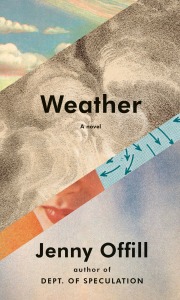 Weather by Jenny Offill
Weather by Jenny Offill
Knopf, February 2020. 207 pg.
fantastic, creative and timely novel addressing the current climate crisis and the impending apocalypse. it’s from the point-of-view of a middle-aged woman –so definitely relatable to me (I want to read more novels about older women). She’s married and has a son. Her brother is a recovering drug addict and she’s had to care for him throughout the years. Jenny Offill excels at this observational narrative. It’s short, riveting, potent. It’s really the perfect thing to read during this COVID-19 pandemic and quarantine we’re all experiencing. Plus it’s quite relatable to middle-aged spinster GenX me: “The woman has just turned fifty. She tells me about her blurriness, the way she is hardly seen. She supposes she is not so pretty anymore–fattish, hair a bit gray. What she has noticed, what gives her a little chill, she tells me, is how if she meets a man out of the context of work, he finds her to not be worth much. He looks over her shoulder as he talks or pawns her off on a woman her own age.”
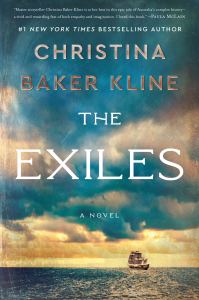 The Exiles by Christina Baker Kline
The Exiles by Christina Baker Kline
Custom House, August 2020. 370 pg.
I loved this amazing work of historical fiction so much and don’t know why I waited so long to write about it! It covers an intriguing aspect of history that I’ve not read much about. Based on actual events, the novel focuses on a ship of female convicts traveling from England to Van Diemen’s Land (Tasmania) in the 1850s. Although Aboriginal people have occupied Australia for thousands of years, the British government views the native people as nuisances and the land to be uninhabited and available for their use. It’s amazing to think about some of the low level crimes for which many were sentenced as well as the harrowing passage. “Evangeline recalled seeing small items in the newspaper over the years about the incorrigibles– men, she thought– transported on convict ships to Australia. Murderers and other deviants exiled to the far side of the earth, ridding the British Isles of the worst of its criminals.” Evangeline is a governess accused of stealing a ring which had been given to her by the family’s older son with whom she’d become romantically involved. She’s well-educated and her late father was a minister. The other staff members didn’t like her. “She was, by temperament, much like her father: diffident, with a shyness often mistaken for aloofness, a bookishness perceived as snobbery.” She’s sentenced to 14 years in prison. She’s pregnant and gives birth to a daughter onboard. Sadly she’s thrown overboard by a crew member who she’d stabbed to protect Hazel, who he’d been sexually assaulting. Hazel is a scrappy convict whose midwife mother taught her many potions and remedies. Mathinna is a native woman who knows how to read and learns to speak French. She’s taken from her tribe by Van Diemen’s governor’s wife on a whim. She considers her a project. It doesn’t work out well. The novel’s a complete page turner and I became so invested in these women I didn’t want it to end.
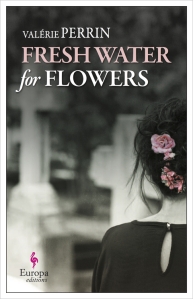 Fresh Water for Flowers by Valerie Perrin
Fresh Water for Flowers by Valerie Perrin
Europa, June 2020. 476 pg.
“My closest neighbors don’t quake in their boots. They have no worries, don’t fall in love, don’t bite their nails, don’t believe in chance, make no promises, or noise, don’t have social security, don’t cry, don’t search for their keys, their glasses, the remote control, their children, happiness.”
I walk in cemeteries fairly often. There’s one in my neighborhood. When I was in grad school, I would drive to the Arlington National Cemetery to take walks through it. I liked the quiet and solitude. I sometimes wonder about the people whose names I see on gravestones. Violette Toussaint is a cemetery caretaker in the small French town Bourgogne. She lives on site. She takes notes on everyone who’s buried there. She’s close friends with three gravediggers, three groundskeepers and a priest. She feeds the stray cats that roam the cemetery. She reads. She bakes. It sounded fairly idyllic to me. I love the writing and this character. Violette is different, interesting, smart, thoughtful. I found myself deeply connected to her– “I don’t fit into boxes. I’ve never fit into boxes. When I do a test in a women’s magazine– “Get to know yourself,” or “Know yourself better”–there’s no clear result for me. I’m always a bit of everything.” I don’t fit in boxes either.
“I’m not after a love story. I’m too old for that. I’ve missed the boat. My meager love life is an old pair of socks shoved to the back of the closet.”
Julian Sole, a police detective, arrives one day and tells Violette that his mother wanted her ashes spread on someone’s grave who wasn’t her husband. He wants to know why. Violette reflects on her own husband who had numerous affairs and left her. She recalls: “He turned our bed into a paradise, was considerate and sensual when making love, but as soon as he got up, was vertical, left our horizontal love behind, he lost a good deal of color. He had nothing to say, and was interested only in his motorbike and video games.” Violette’s mother abandoned her and she was pregnant at 18. Drawn to each other, Violette and Julian spend more time together as they help reconcile the past. There are more secrets of the dead and the past revealed but I can’t give too much away or I’d ruin it. The novel unwinds with several twists. It’s smart, funny and dark. Just what I like. It’s a full reflection on life and death and everything involved.
Julian Sole, a police detective, arrives one day and tells Violette that his mother wanted her ashes spread on someone’s grave who wasn’t her husband. He wants to know why. Violette reflects on her own husband who had numerous affairs and left her. She recalls: “He turned our bed into a paradise, was considerate and sensual when making love, but as soon as he got up, was vertical, left our horizontal love behind, he lost a good deal of color. He had nothing to say, and was interested only in his motorbike and video games.” Violette’s mother abandoned her and she was pregnant at 18. There are more secrets of the dead and the past revealed but I can’t give too much away or I’d ruin it. The novel unwinds with several twists. It’s smart, funny and dark. Just what I like. It’s a full reflection on life and death and everything involved.
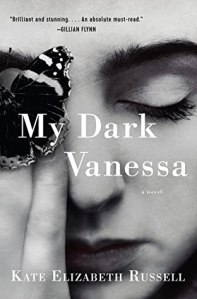 My Dark Vanessa by Kate Elizabeth Russell
My Dark Vanessa by Kate Elizabeth Russell
William Morrow, March 2020. 373 pg.
A 42-year-old English teacher at a prep school in Maine grooms then rapes his 15-year-old student. Although it’s a story that ‘s been told numerous times, it’s a remarkably strong perspective that’s completely engrossing. The story alternates between 2000 and 2017 where adult Vanessa finds herself finally recognizing the level of abuse and how it’s affected her. I have a memory from high school of being in gym class and one of my classmates going up to a (very attractive) teacher and unbuttoning a button on his shirt and commenting something about the full buttoned up style. It was so bold. That was how this popular student commanded attention. I didn’t even kiss a boy until college. Vanessa is incredibly naïve as a student: “It wasn’t about how young I was, not for him. Above everything else, he loved my mind. He said I had genius-level emotional intelligence and that I wrote like a prodigy, that he could talk to me, confide in me. Lurking deep within me, he said, was a dark romanticism, the same kind he saw within himself. No one had ever understood that dark part of him until I came along.” Vanessa writes poetry. Mr.. Strane gives her Sylvia Plath, Emily Dickinson, Edna St. Vincent Millay to read and then he gives her Lolita. As an adult, Vanessa recognizes: “I still feel different from others, dark and deeply bad, same as I did at fifteen, but I’ve tried to gain a better understanding of the reasons. I”ve become an expert on the age-gap trope, consuming books, films, anything featuring a romance between an adult and legal child. I search endlessly for myself but never find anything truly accurate.” She’s also finding it difficult to have relationships with me. She notes: “There are men who never turn into boyfriends, who peer behind the curtain and see the mess of me–literal and figurative: the apartment with a narrow path through the clothes and trash leading from bed to bathroom; the drinking, endless drinking; the blackout sex and nightmares.”
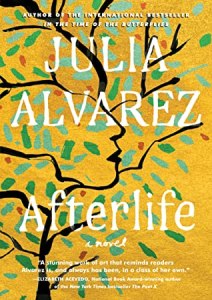 Afterlife by Julia Alvarez
Afterlife by Julia Alvarez
Algonquin, April 2020. 256 pg.
Antonia is a recently widowed, retired English teacher who lives in Vermont. One night she arrives home to find an undocumented pregnant teenager on her doorstep. Then, her sister, who suffers with Bipolar disorder, goes missing. “You’re the most American of us, her sisters have commented to Antonia in an accusatory tone. Just saying, they said smugly when she asked what was wrong with being whoever she was. Admittedly, she was the worrier, the insomniac, the most anxious and disciplined of the sisters.” Through gorgeous prose and astute observations, Julia Avarez examines a woman’s struggles to maintain her individual identity as well as to navigate relationships with her three sisters and her immigrant community.
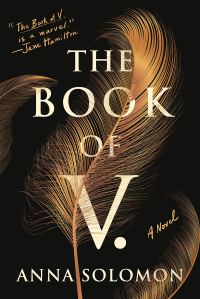 The Book of V by Anna Solomon
The Book of V by Anna Solomon
Henry Holt & Company, May 2020, 320 pg.
I gasped excitedly when I walked into the break room at my bookstore job and saw the ARC of this novel. I tore through this book in two days. Leaving Lucy Pear is one of my favorite novels and now after reading this I’ll count Anna Solomon as a favorite author. This novel focuses on three Jewish women– Lily is a mother, second wife and writer in 2016. Vivian is a political wife during the Watergate-era. Esther is an independent woman in ancient Persia. They’re all strong, independent-minded women. and Solomon fully explores each character’s motivations, desires, needs, struggles, commonalities and connections across the centuries.
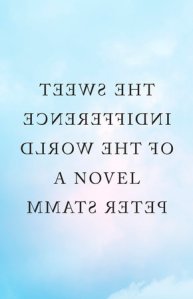 The Sweet Indifference of the World by Peter Stamm
The Sweet Indifference of the World by Peter Stamm
Other Press, January 2020. 160 pg.
I only read one book by a white male author and this is it. I have a handful of favorite cis white male authors and Peter Stamm counts as one of them. I read them immediately. I appreciate his gorgeous, melancholy writing. This one is short and interesting– a writer, Christoph, meets a woman, Lena, who is the doppelganger of his former lover, Magdalena, who inspired his first novel post breakup. Lena recognizes her own relationship with a writer named Chris in the story she’s told. This one blurs past and present, fiction and reality. How much does reality influence fiction and fiction influence reality? He comments: “With youthful pathos, I had believed I had to decide between her and my writing, between freedom and love. Only now did I understand that love and freedom were not mutually exclusive, but mutually entailed: the one wasn’t possible without the other.”
BOOK REVIEW: Perfect Tunes
Posted by Amy Steele in Books on November 23, 2020
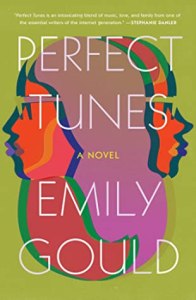 Perfect Tunes by Emily Gould. Avid Reader Press| April 2020| 272 pages| $26.00| ISBN: 978-1-5011-9749-9
Perfect Tunes by Emily Gould. Avid Reader Press| April 2020| 272 pages| $26.00| ISBN: 978-1-5011-9749-9
RATING: 3.5 /5*
Laura, an aspiring singer/songwriter from Ohio, moves to New York to share an apartment with Callie, her best friend from high school. Despite her plans to avoid dating, Laura ends up falling in love with the bass player in an up-and-coming band. Turns out she’s more into him than he is with her: “Laura fought back the urge, again, to tell him that she loved him, to claim him officially somehow. The thought of him with random girls in different cities made her want to peel off her skin. She wished that they were married. She wanted everyone he met to know they were together. There was no possible way to express any of this to him.” It turns out that Laura wants to be independent and successful on her own merits but also wants to be in a relationship. Which, of course, is possible. It just isn’t possible with this guy. She’s a people pleaser and I almost cringed at the part where she’s over there cooking dinner for Dylan and his roommate/bandmate. I had a crush on a guy in a band one time and would walk his dog for him several times a week thinking that would make him more interested in me. Foolishness that I can’t say I didn’t repeat.
Dylan enjoys the attention and frenetic lifestyle associated with being in a band and touring. Laura and Callie form a band that opens for Dylan’s band and has some potential due to Laura’s songwriting prowess. Dylan’s a troubled soul struggling with a mood disorder and addiction. Sadly relatable: “He was swaying and slurring as he said this. Laura understood, without wanting to, that Dylan was much more interested in getting fucked up than he was in having sex with her.” The short-lived romance ends in tragedy and a life-changing pregnancy for Laura. She ultimately chooses her daughter over her career and her friend Callie ends up with a successful music career; maybe the one that Laura initially wanted.
Divided into three parts, the novel focuses on Laura’s early years in New York, Laura being a young mother and then on Laura’s teenage daughter Marie and her desire to learn about her biological father. As I’ve worked in the music business and have followed bands and dated musicians and experienced unrequited love (too often), I could completely relate to Laura’s early experiences in New York. I lost a bit of interest in the motherhood part. I wanted more details and focus on Laura’s songwriting. The title suggested as much and I expected more. Despite its pivot from singer/songwriter to motherhood, it’s a mostly enjoyable, quick read. Although I was disappointed, I still kept reading which attests to Emily Gould’s writing talents. I’ll try another one of her novels.
book review: The Accidentals
Posted by Amy Steele in Books on September 3, 2019
The Accidentals by Minrose Gwin. William Morrow| August 2019| 381 pages | $16.99| ISBN: 978-0-06-247175-8
RATING: ****/5*
–review by Amy Steele
“That fall June and I had at long last begun to plumb the depth of our mother’s unhappiness.”
In 1957, Olivia McAlister chooses to have an abortion in Mississippi. Illegal at the time, the only options for abortion were often cheap, quick back-alley abortions. Olivia longed to return to New Orleans and feels like an “accidental”—a migratory bird flown off course. Olivia dies leaving her two daughters, Grace and June, and her husband Holly on their own, the effects far-reaching throughout their lives. Holly becomes obsessed with building a bomb shelter. The daughters struggle to find their place in the world.
As a teenager, Grace becomes involved in a love affair with two boys. When she becomes pregnant, she’s sent away to have the child. Originally the aunt had planned the raise the child as her own but the child’s born with a facial defect—a cleft palate—and the aunt gets scared away. At an orphanage, the baby has an accident and is presumed dead. Ed Mae Johnson, an African-American care worker ends up taking the child home and raising her. Grace goes to college and later grad school. She travels the world studying ancient texts—“Here I am, fluent in Greek and Latin and Arabic. I can examine a piece of papyrus and give you its age within twenty years . . .” She works as a professor. She bird watches and feeds the wildlife in her backyard.
“One of the few things I’d come to pride myself on was having learned to take pleasure in things nobody else would think twice about. I had no expectations so I was constantly surprised by small pleasures. A thick peanut and butter and jelly sandwich, flocks of blackbirds flashing their red-tipped wings as they swooped down on the corn, Elsa’s celery smell at the end of a day in the kitchen. The first snow of winter, which had fallen just the past week and melted the next day.”
June finds religion as a teenager. She goes to church with a friend and gets baptized. She practices kissing with a female friend until that friend gets a boyfriend. She attends college and works as a journalist. She notes: “… I am the bona fide reporter, hardcore police beat and such, first woman in my paper’s history to work the news desk.” June unhappily marries and has a son. After undergoing cancer treatment, she starts fostering and adopting dogs—“These dogs of mine, they weren’t pretty to look at, and after Noel left, I made a point to choose the ones I know didn’t have a rat’s chance of getting taken.”
Everyone ends up in Nashville, Tennessee at the end. After many years with little communication or contact, June moves to help Grace after she’s diagnosed with Alzheimer’s. Grace’s baby, now grown, lives in the city too. They may have already met. The Accidentals packs in plenty of details as chapters alternate points-of-view. It’s a lovely story about resilience, forgiveness and family bonds.
FTC Disclosure: I received this book for review from William Morrow.
STEELE INTERVIEWS: Claire Gibson
Posted by Amy Steele in Books on July 26, 2019
“When they finally reached the hill, Dani watched the rest of her female company mates zigzag across the valley, providing cover fire and dragging the rest of the guys in their platoon, with their various feigned injuries, up to the safe zone. Apparently the ambush had been swift and fierce. Bodies were strewn everywhere. The girls had all survived, while the boys in their platoon had all been taken out of the game. Apparently the boys had been a bit overly aggressive; the girls had the presence of mind to assess the threat before taking action.”
Beyond the Point is an intriguing and engrossing novel that focuses on three very different women—Dani, Avery and Hannah—who meet at West Point. Beyond the Point follows them through school and post-graduation. They’re such strong women and well-developed characters that it’s easy to invest in them. They attend the mostly male West Point in preparation for a male-dominated military career. As they navigate life, the women confide in, encourage and support each other. It’s fascinating, infuriating, inspiring and moving.
Dani is a competitive force, both intelligent and athletic. Dani’s happy to be at West Point and move beyond stereotypes –“Her small-minded suburban town of Columbus, Ohio, had tried to put her into a box.” She’s successful in many ways but struggles with romantic relationships–“Guys always loved to hang out with her, but they rarely saw her as ‘girlfriend material.’ It was her constant relationship kryptonite.”
Avery is the wild-child who would rather not follow the rules, difficult at West Point and in the military. She comes from a strict family and won’t find much relief. Gibson writes: “The Army, at times, infuriated Avery. All of its rules. Its demands. Its ladders of authority. The Army was a lot like her dad, actually—constantly providing new bars to reach, moving each bar higher every time Avery to close. It wasn’t that she needed to be coddled, but to hear that she was doing a good job every once in a while wouldn’t have hurt. She could handle being read the riot act for leaving a job unfinished or for not meeting the standards. But was she really about to be counseled about who she dated on weekends?” Her bohemian spirit often frustrates her friends. I found her the most relatable–“Relationships didn’t work for her the way they did for everyone else. She was either too trusting and got burned, or too suspicious and exhausted the guy’s patience. She either acted too serious and scared the guy away, or acted too cool, leaving the guy confused about her commitment.”
The West Point legacy, Hannah seems to have it easy. West Point and the military are her destiny. She’s quite religious and a bit more conservative than her friends. She ends up meeting her future husband at West Point. She faces the same sexism as her peers–—“Hannah had been one of the highest-ranking cadets at West Point—guy or girl. Now her ovaries were a flashing neon sign to everyone in the room that she couldn’t keep up.”
Author Claire Gibson completed extensive research and interviews with West Point graduates before writing the novel. I recently interviewed her via email.
Amy Steele: Why did you want to write this novel about West Point?
Claire Gibson: Anyone that has ever been to visit West Point will tell you that it’s a magical, sacred place. I had the privilege of growing up at West Point right there alongside the Corps of Cadets, while my father was a professor. I know it like the back of my hand. The only way I could have known it better was if I had attended myself — which continues to be something I wonder about all the time — how would I have handled the challenge? Should I have tried? But college choices aside, when I began writing full time, I couldn’t kick the gut feeling that I was supposed to write something about West Point or the Army. Then in 2013, a group of women West Point graduates asked if I’d be interested in interviewing them for a possible story. The more women I spoke to, the more confident I was that I was meant to write their experiences down as a novel — something that every person could engage with, whether they were familiar with West Point or not.
Amy Steele: What do you like about each woman—Dani, Hannah and Avery—and how did you decide to focus on these three characters?
Claire Gibson: All of the characters in Beyond the Point are composite characters — Dani, Hannah and Avery’s storylines are the product of more than 25 different interviews with women who graduated from West Point in the decade after 9/11. However, just because the characters are composite and the story is fiction, much of the content came directly from first person accounts. I love Dani’s grit, Hannah’s faith, and Avery’s boldness. They’re so different as women, and yet so complementary as friends.
Amy Steele: How is the Bennett’s house similar to your home growing up?
Claire Gibson: Wendy Bennett is loosely based on my mother, who is as kind and hospitable and wise as any woman I’ve ever met. Like our home, the Bennett’s house is full of antiques, and full of the smell of something fresh baked from the oven. There is always a pan of brownies on our counter and cadets coming through our front door. My family took pride in being a “home away from home” for those college kids in need of a break from the barracks.
Amy Steele: You packed a lot of events and details into this novel, how do you organize your writing?
Claire Gibson: I use a software called Scrivener which is so necessary for a long project like a novel.
Amy Steele: What was the biggest takeaway from the interviews you conducted in preparation for writing the novel? Particularly about striving in a male-dominated environment.
Claire Gibson: I don’t know if there was one great takeaway. However, I will say that these women learned how to hold their own amongst men starting at age 18. It’s no wonder many of them have gone on to excel in other male-dominated environments. By the time they graduated at age 24, the fact that they were a minority had faded in importance.
Amy Steele: What did you learn growing up at West Point?
Claire Gibson: At West Point, I learned the important of selfless service and kindness to others. I also learned to love America, which despite its many faults, is still a nation that strives for ideals that I deeply believe in.
Amy Steele: What challenges do women in the military currently face? Have there been any improvements in the military’s handling of sexual assault and sexual assault reporting?
Claire Gibson: Women in the military face the same challenges as women who are not in the military. They struggle to balance work with life. They want to find meaningful romantic relationships. They dream about the future and hope that they’re making wise choices in the present. I know the military is working to prosecute sexual assaults more stringently — and yet, we know now through things like the #MeToo movement that sexual harassment and assault are not limited only to the military. I hope that as a whole, our society will work to eliminate that stain from our culture. Rediscovering the sanctity of sex would help promote progress in that arena.
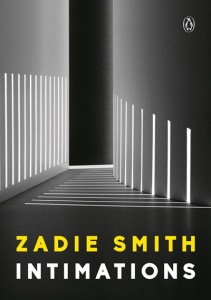









You must be logged in to post a comment.